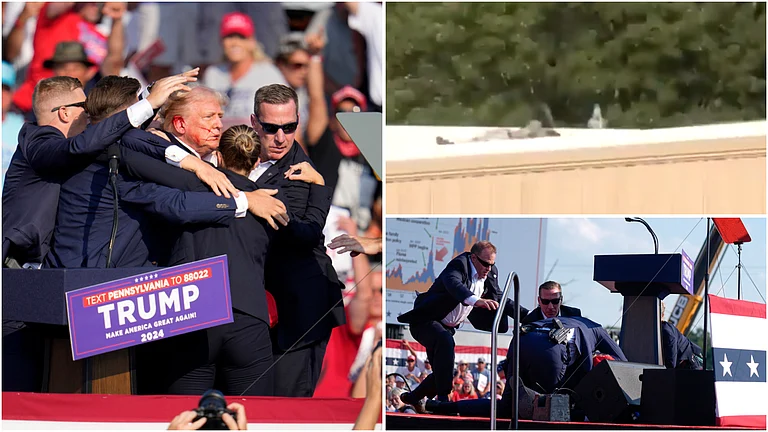Multiple failures of the Secret Service leading up to former US President Donald Trump's Pennsylavnia rally in July, where an assassination attempt was made on him, were "foreseeable, preventable", a bipartisan Senate investigation revealed.
The interim report from the Senate Homeland Security and Governmental Affairs Committee found failures on almost every level ahead of the July campaign rally, including in planning, communications, security and resource allocation.
Michigan Senator Gary Peters, the Democratic chairman of the Homeland panel, said, "The consequences of those failures were dire."
The Senate probe found that there was no clear chain of command among the Secret Service and other security agencies, and neither was there a plan for coverage of the building in the rally's vicinity, on which the shooter -- Thomas Matthew Crook -- had climbed up to fire the shots.
Notably, former Secret Service chief Kimberly Cheatle had told the House Oversight Committee that the Republican Presidential candidate's assassination attempt was the "most significant operational failure in decades".
Michigan Senator Gary Peters has noted that officials at the time were operating on multiple, separate radio channels, leading to missed communications. He added that an unseasoned drone operator was stuck on a helpline after his equipment was not working properly. Peters said communications among security personnel were a "multi-step game of telephone".
The Senate's interim report also found that Secret Service was notified of an individual on the building roof nearly two minutes before Crooks opened eight rounds of fire in Trump's direction, less than 150 yards from where the former President was standing.
In the assassination attempt, before the shooter was gunned down by a Secret Service counter-sniper, Trump's ear was grazed by a bullet or a bullet fragment, with one rally participant being dead and two others injured.
The report found that a local officer had sent a radio alert about an armed individual on the building approximately 22 seconds before the firing on Trump took place.
Cheatle, however, had told the House Oversight Committee that though the shooter was spotted, he was identified as "suspicious", not as a "threat".
“If the detail had been passed information that there was a threat, the detail would never have brought the former president out onto stage,” the then Secret Service chief had said.
Cheatle had promised to "move heaven and earth' to get to the bottom of what went wrong and make sure that this doesn't happen again. "The Secret Service's solemn mission is to protect our nation's leaders. On July 13, we failed," she told the HOC.
The Senate report has been released days after the Secret Service put out a five-page document summarising the key conclusions of a yet-to-be-finalised Secret Service report on what went wrong during the Butler, Pennsylavnia shooting.
Every new information that is being discovered points towards a amssive breakdown in the former President's security detail. Kentucky Senator Rand Paul, the top Republican on the panel, was quoted as saying by The Associated Press, "This was the result of multiple human failures of the Secret Service."
The Senate report recommended that the top security agency better defines the roles and responsibilities before any such protective event, including by designating an in-charge for approving all security plans. The investigation had found that many people who were 'in-charge' denied having responsibility of any planning or security failures, and rather diverted the blame.
The report said that agents who were interviewed during the probe told them that planning as well as security decisions were taken jointly, with no specific person responsible for approval.
It was also found that communication of the Secret Service with local authorities was poor, wherein two days prior to the shooting, local law enforcement had told the agents about not having enough manpower to lock down the building where shooter Thomas Crooks perched. Secret Service agents then gave investigators conflicting accounts about who was responsible for the securtiy coverage, the report added.
The internal review, which was released by the Secret Service last week, had also noted several communications breakdowns, including an absence of clear instructions to the local law authorities, and failure to fix line-of-sight vulnerabilities at the rally ground in Butler, and "complacency" amond some agents.
Secret Service acting director Ronald Rowe Jr, after the release of the report, said, "This was a failure on the part of the United States Secret Service. It's important that we hold ourselves to account for the failures of July 13th and that we use the lessons learned to make sure that we do not have another failure like this again.
ALSO READ | 'I'm Supposed To Be Dead': Donald Trump Recalls Surviving 'Surreal' Assassination Attempt
Additionally, the senators recommended that Secret Service completely overhaul its communications operations at protective events and improve intelligence sharing. They also recommended that Congress evaluate whether more resources are needed.
However, given the agency’s recent failures, Democrats and Republicans have disagreed on whether to give the Secret Service more money. A spending bill is on the track to be passed before the end of the month, which also includes an additional USD 231 million for the agency. But many Republicans have said that the agency needs an internal overhaul first. “This is a management problem plain and simple,” said Wisconsin’s Senator Ron Johnson, the top Republican on the Homeland panel's investigations sub-committee.
On July 13, 20-year-old Thomas Matthew Crooks had fired six to eight shots at Trump with an AR-15 rifle during an election rally in Pennsylvania’s Butler. The former US President had later, in an interview, said that it was a “surreal” experience.
























.png?w=200&auto=format%2Ccompress&fit=max)





